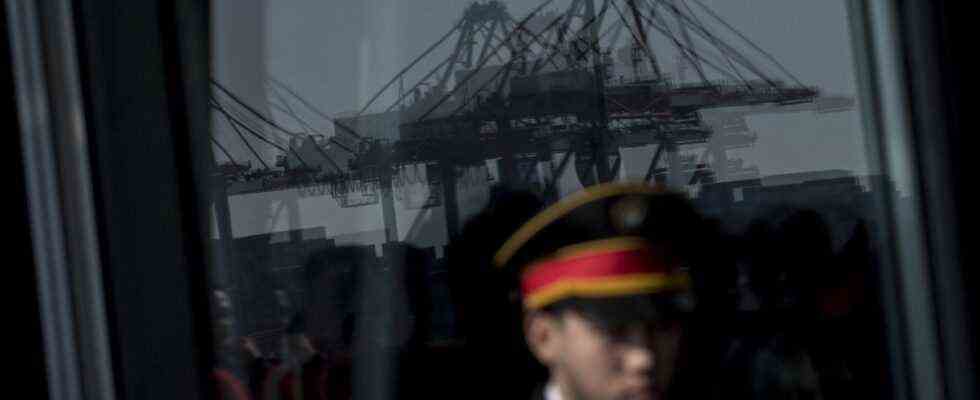It is one of the most modern plants in the world that the German automotive supplier Continental opened in Kaunas, Lithuania in 2019. Components for the car of the future will be built here: devices for intelligent glass control or radar sensors for autonomous driving. “It is the largest investment project in Lithuanian history,” said then Prime Minister Saulius Skvernelis. The decision to “set up a production facility in Lithuania” will have “enormously positive effects,” he predicted.
Today all of a sudden it’s all very questionable. Because: The German group has got into the conflict between Lithuania and China. And because the leadership in Beijing escalated the dispute again this week, the controls and sensors from Kaunas are now stuck in Chinese ports. The Lithuanian problem has also become a German one.
It all started with a dispute over Lithuania’s rapprochement with Taiwan. In November, Taiwan opened a representative office in Vilnius, the capital of Lithuania, as well as in many other EU countries – but they always only have “Taipei” in their name, named after Taiwan’s capital. Beijing sees Taiwan as part of China – and reacted with anger when the Lithuanians now declared that the Taipei representation could be called “Taiwan Representation” in their country.
Series of punitive actions
The Chinese apparatus has since responded with a whole series of punitive actions. Beijing withdrew its ambassador from Vilnius in August. For a good two weeks, China has completely blocked trade with Lithuania. And on Wednesday of this week, the Baltic country evacuated its embassy in Beijing after the Lithuanian diplomats received an order from the Chinese Foreign Office to downgrade their embassy to chargé d’affaires. They should remove the embassy badge and submit their diplomatic accreditations for exchange. The Lithuanian Foreign Minister Gabrielius Landsbergis stressed on Wednesday that the embassy had by no means been closed, the diplomats had only returned home “for consultations”.
The economic escalation began in early December when the Chinese customs authorities suddenly no longer listed Lithuania in their database. As if the country didn’t even exist. The consequence: Customs forms for loads from Lithuania could no longer be processed. Around 1000 containers are now accumulating, and the number is increasing every day.
After the first Lithuanian companies complained and the government in Vilnius informed the European Commission, the Chinese state media initially spread the myth that Chinese importers were taking precautionary measures and that the authorities had no control over them. About five days ago, entrepreneurs report, customs re-activated the country code for Lithuania, 336. The goods do not come to China anyway, as the system now crashes every time the freight documents are uploaded – allegedly it is a “temporary computer error”.
Will the dispute soon also affect VW and BMW?
In addition to Continental, the Süddeutsche Zeitung Another German automotive supplier and a substrate manufacturer, a customs description for a company that extracts peat in Lithuania and exports to China. American pharmaceutical companies are also waiting for raw materials from Lithuania.
From a Chinese point of view, the Lithuanian imports worth EUR 300 million may sound relatively insignificant. In times of Corona, however, the supply chains are so tense that a tiny part made by Continental in Kaunas that does not enter the country can paralyze the production of Volkswagen, BMW or Daimler in China.
So what’s next? The facts are incontrovertible; China has imposed a trade embargo on Lithuania, just as the Americans do with North Korea or Iran. The subtle difference: Both the People’s Republic and Lithuania, as EU members, belong to the World Trade Organization (WTO). Their contracts exclude a complete break in trade.
Fear of Chinese reprisals
In the EU, the Commission is responsible for trade policy. The responsible Commission Vice-President Valdis Dombrovskis – a former prime minister of neighboring Latvia – says the Union “stands ready to defend member states against pressure or possible sanctions”. According to a spokeswoman, the authority is in close contact with the Lithuanian government and the EU representation in Beijing. The commission is also asking the Chinese government for clarification.
The Commission would have a good chance of bringing China to the WTO – and this could ultimately lead to punitive tariffs. However, affected companies would have to provide relevant evidence, and there is great fear of Chinese reprisals. Without detailed documentation, a WTO procedure is hopeless. A meeting will therefore take place in the Ministry of Economics in Berlin in the coming week.

